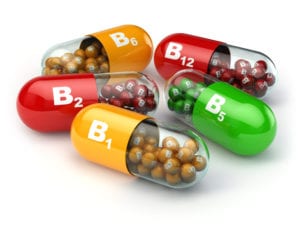Written by Taylor Woosley, Staff Writer. Subjects in the highest riboflavin intake had a 45% reduction in the relative risk of CVD mortality compared to those with the lowest intake.
 Cardiovascular disease (CVD) is the leading cause of morbidity and mortality globally1. Typically not a singular disease, CVD often coexists with dyslipidemia, hypertension, type-2 diabetes (T2D), chronic system-wide inflammation, and obesity2. Traditional risk factors of CVD include smoking, physical inactivity, poor nutrition, and alcohol consumption3.
Cardiovascular disease (CVD) is the leading cause of morbidity and mortality globally1. Typically not a singular disease, CVD often coexists with dyslipidemia, hypertension, type-2 diabetes (T2D), chronic system-wide inflammation, and obesity2. Traditional risk factors of CVD include smoking, physical inactivity, poor nutrition, and alcohol consumption3.
Micronutrients, including many vitamins and minerals, are involved in pathways that can modulate inflammation and oxidative damage and thus are thought to play a role in reducing CVD occurrence4. Recent epidemiological studies have shown protective associations between intake of B vitamins (folate, riboflavin, B12) and risk of CVD5. The associations have been supported by several possible underlying pathophysiologic mechanisms, such as impaired endothelial function, increased oxidative stress, and induced vascular inflammation6.
Li et al. conducted a study to assess the association between the dietary intake of riboflavin and mortality in the US general adult population, while also investigating the interaction between riboflavin and folate intake in relation to mortality. Data included in the study was from the 2006-2016 cycles of the National Health and Nutrition Examination Survey (NHANES) and was followed until the end of 2019. Information obtained through each NHANES cycle featured demographics, dietary records, examination, laboratory, and questionnaires. Subject inclusion consisted of being 20 years of age or older, having plausible dietary intake records obtained from 2-day 24-hour recall records, with available health information such as metabolic syndrome, depression, and sleep duration.
A 2-day diet recall method was used to obtain dietary intakes of riboflavin and folate. Nutrient intake was evaluated using the United States Department of Agriculture (USDA) Food and Nutrient Database for Dietary Studies (FNDDS). The National Death Index was utilized to determine the mortality status of participants during the 2005-2016 cycles. Covariates included in the analysis were age, gender, race or ethnicity, education, family income related to poverty, alcohol consumption, energy intake, and self-reported histories of cardiovascular disease, hypertension, metabolic syndrome, depression, and sleep duration. A Cox regression analysis was utilized to investigate the association between riboflavin and all-cause mortality or CVD mortality.
10,480 adults (mean age 50.3 years) were included in the final analysis. By 2019, with a mean follow-up of 8.5 years, a total of 1214 deaths were registered, with 373 (30.7%) deaths from CVD and 302 (24.9%) deaths from cancer. Significant findings of the study are as follows:
- Weighted overall mortality incident rates for riboflavin quartiles were 12.61, 9.34, 10.20, and 7.00 (p < 0.001). The CVD mortality incident rate from lower riboflavin intake was significantly higher than the rate from higher intake with the corresponding rates (case/1000 person years) of 3.30, 3.41, 3.14, and 1.84 (p < 0.001).
- The unadjusted hazard ratio (HR, 95% CI) of all-cause mortality of riboflavin intake across the quartiles was 1.0 (reference), 0.74 (0.59-0.93), 0.80 (0.65-0.99), and 0.61 (0.50-0.75) (p for trend < 0.001).
- Among participants with a high intake of folate, the HR (95% CI) for CVD had a further reduction to 0.48 (0.21-1.09) for Q2, 0.26 (0.11-0.66) for Q3, and 0.20 (0.08-0.50) for Q4.
Results of the study using nationally representative data show that participants with higher riboflavin consumption had a reduced risk of CVD mortality and all-cause mortality. Furthermore, a significant multiplicative interaction was observed between riboflavin intake and folate intake and risk of CVD mortality. Study limitations include the use of 2-day 24-hour dietary recalls to assess riboflavin which does not accurately portray long-term habitual riboflavin intake, potential confounding factors that could effect biomarkers, and the lack of objective riboflavin measures.
Source: Li, Ming, and Zumin Shi. “Riboflavin Intake Inversely Associated with Cardiovascular-Disease Mortality and Interacting with Folate Intake: Findings from the National Health and Nutrition Examination Survey (NHANES) 2005–2016.” Nutrients 14, no. 24 (2022): 5345.
© 2022 by the authors. Licensee MDPI, Basel, Switzerland. This article is an open access article distributed under the terms and conditions of the Creative Commons Attribution (CC BY) license (https://creativecommons.org/licenses/by/4.0/).
Click here to read the full text study.
Posted October 16, 2023.
Taylor Woosley studied biology at Purdue University before becoming a 2016 graduate of Columbia College Chicago with a major in Writing. She currently resides in Glen Ellyn, IL.
References:
- O’Sullivan JW, Raghavan S, Marquez-Luna C, et al. Polygenic Risk Scores for Cardiovascular Disease: A Scientific Statement From the American Heart Association. Circulation. Aug 23 2022;146(8):e93-e118. doi:10.1161/cir.0000000000001077
- Mullins AP, Arjmandi BH. Health Benefits of Plant-Based Nutrition: Focus on Beans in Cardiometabolic Diseases. Nutrients. Feb 5 2021;13(2)doi:10.3390/nu13020519
- Evans MA, Sano S, Walsh K. Cardiovascular Disease, Aging, and Clonal Hematopoiesis. Annual review of pathology. Jan 24 2020;15:419-438. doi:10.1146/annurev-pathmechdis-012419-032544
- Sunkara A, Raizner A. Supplemental Vitamins and Minerals for Cardiovascular Disease Prevention and Treatment. Methodist Debakey Cardiovasc J. Jul-Sep 2019;15(3):179-184. doi:10.14797/mdcj-15-3-179
- Mumu SJ, Merom D, Ali L, et al. Validation of a food frequency questionnaire as a tool for assessing dietary intake in cardiovascular disease research and surveillance in Bangladesh. Nutr J. May 14 2020;19(1):42. doi:10.1186/s12937-020-00563-7
- Yuan S, Mason AM, Carter P, Burgess S, Larsson SC. Homocysteine, B vitamins, and cardiovascular disease: a Mendelian randomization study. BMC Med. Apr 23 2021;19(1):97. doi:10.1186/s12916-021-01977-8
